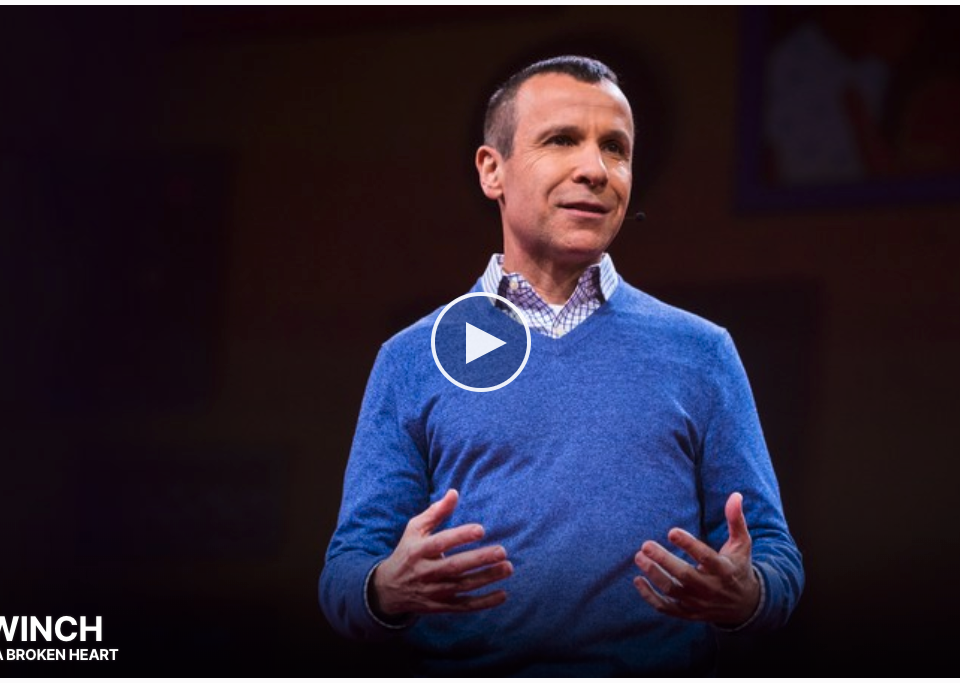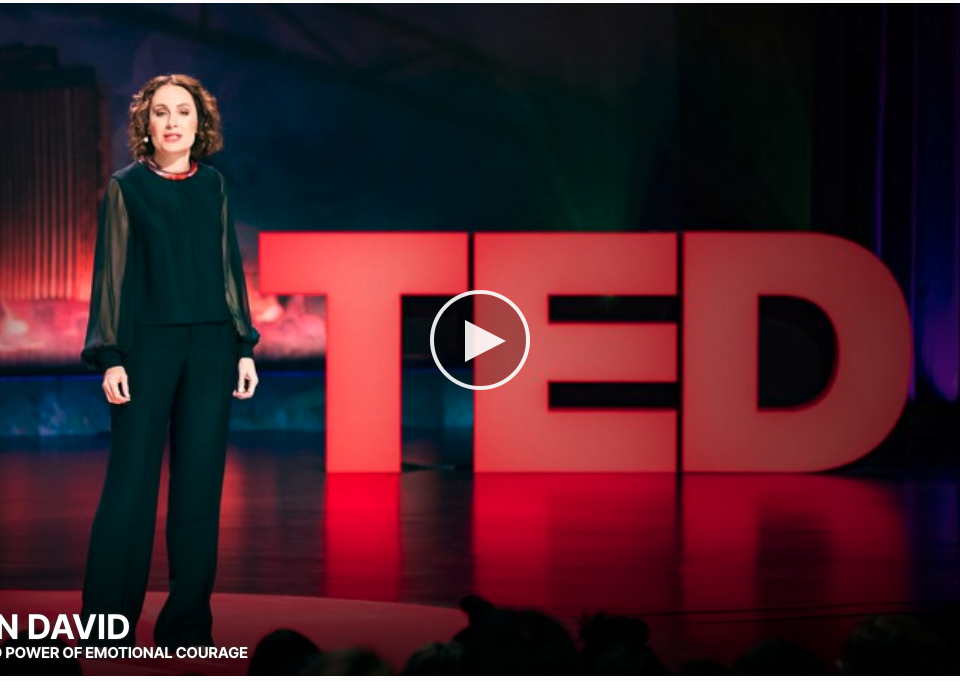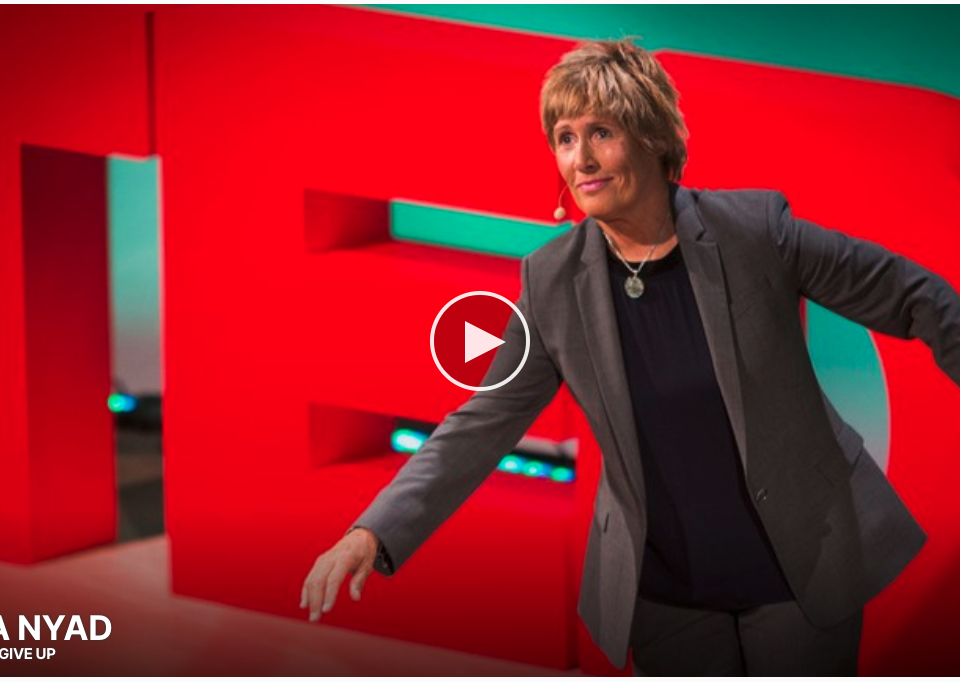
Transhumanism: 5 characteristics of the contemporary race against death
5 de dezembro de 2018
This bike path paved with solar panels shows that all streets could double as power sources
10 de dezembro de 2018There’s a man out there, somewhere, who looks a little bit like the actor Idris Elba, or at least he did 20 years ago. I don’t know anything else about him, except that he once saved my life by putting his own life in danger. This man ran across four lanes of freeway traffic in the middle of the night to bring me back to safety after a car accident that could have killed me. And the whole thing left me really shaken up, obviously, but it also left me with this kind of burning, gnawing need to understand why he did it, what forces within him caused him to make the choice that I owe my life to, to risk his own life to save the life of a stranger? In other words, what are the causes of his or anybody else’s capacity for altruism?
But first let me tell you what happened. That night, I was 19 years old and driving back to my home in Tacoma, Washington, down the Interstate 5 freeway, when a little dog darted out in front of my car.And I did exactly what you’re not supposed to do, which is swerve to avoid it. And I discovered why you’re not supposed to do that. I hit the dog anyways, and that sent the car into a fishtail, and then a spin across the freeway, until finally it wound up in the fast lane of the freeway faced backwards into oncoming traffic and then the engine died. And I was sure in that moment that I was about to die too, but I didn’t because of the actions of that one brave man who must have made the decision within a fraction of a second of seeing my stranded car to pull over and run across four lanes of freeway traffic in the dark to save my life. And then after he got my car working again and got me back to safety and made sure I was going to be all right, he drove off again. He never even told me his name, and I’m pretty sure I forgot to say thank you.
So before I go any further, I really want to take a moment to stop and say thank you to that stranger.
I tell you all of this because the events of that night changed the course of my life to some degree. I became a psychology researcher, and I’ve devoted my work to understanding the human capacity to care for others. Where does it come from, and how does it develop, and what are the extreme forms that it can take? These questions are really important to understanding basic aspects of human social nature. A lot of people, and this includes everybody from philosophers and economists to ordinary people believe that human nature is fundamentally selfish, that we’re only ever really motivated by our own welfare. But if that’s true, why do some people, like the stranger who rescued me, do selfless things, like helping other people at enormous risk and cost to themselves? Answering this question requires exploring the roots of extraordinary acts of altruism, and what might make people who engage in such acts different than other people. But until recently, very little work on this topic had been done.
The actions of the man who rescued me meet the most stringent definition of altruism, which is a voluntary, costly behavior motivated by the desire to help another individual. So it’s a selfless act intended to benefit only the other. What could possibly explain an action like that? One answer is compassion, obviously, which is a key driver of altruism. But then the question becomes, why do some people seem to have more of it than others? And the answer may be that the brains of highly altruistic people are different in fundamental ways.
But to figure out how, I actually started from the opposite end, with psychopaths. A common approach to understanding basic aspects of human nature, like the desire to help other people, is to study people in whom that desire is missing, and psychopaths are exactly such a group. Psychopathy is a developmental disorder with strongly genetic origins, and it results in a personality that’s cold and uncaring and a tendency to engage in antisocial and sometimes very violent behavior. Once my colleagues and I at the National Institute of Mental Health conducted some of the first ever brain imaging research of psychopathic adolescents, and our findings, and the findings of other researchers now, have shown that people who are psychopathic pretty reliably exhibit three characteristics. First, although they’re not generally insensitive to other people’s emotions, they are insensitive to signs that other people are in distress. And in particular, they have difficulty recognizing fearful facial expressions like this one. And fearful expressions convey urgent need and emotional distress, and they usually elicit compassion and a desire to help in people who see them, so it makes sense that people who tend to lack compassion also tend to be insensitive to these cues.
The part of the brain that’s the most important for recognizing fearful expressions is called the amygdala. There are very rare cases of people who lack amygdalas completely, and they’re profoundly impaired in recognizing fearful expressions. And whereas healthy adults and children usually show big spikes in amygdala activity when they look at fearful expressions, psychopaths’ amygdalas are underreactive to these expressions. Sometimes they don’t react at all, which may be why they have trouble detecting these cues. Finally, psychopaths’ amygdalas are smaller than average by about 18 or 20 percent.
So all of these findings are reliable and robust, and they’re very interesting. But remember that my main interest is not understanding why people don’t care about others. It’s understanding why they do. So the real question is, could extraordinary altruism, which is the opposite of psychopathy in terms of compassion and the desire to help other people, emerge from a brain that is also the opposite of psychopathy? A sort of antipsychopathic brain, better able to recognize other people’s fear, an amygdala that’s more reactive to this expression and maybe larger than average as well?
As my research has now shown, all three things are true. And we discovered this by testing a population of truly extraordinary altruists. These are people who have given one of their own kidneys to a complete stranger. So these are people who have volunteered to undergo major surgery so that one of their own healthy kidneys can be removed and transplanted into a very ill stranger that they’ve never met and may never meet. “Why would anybody do this?” is a very common question. And the answer may be that the brains of these extraordinary altruists have certain special characteristics.They are better at recognizing other people’s fear. They’re literally better at detecting when somebody else is in distress. This may be in part because their amygdala is more reactive to these expressions.And remember, this is the same part of the brain that we found was underreactive in people who are psychopathic. And finally, their amygdalas are larger than average as well, by about eight percent. So together, what these data suggest is the existence of something like a caring continuum in the world that’s anchored at the one end by people who are highly psychopathic, and at the other by people who are very compassionate and driven to acts of extreme altruism.
But I should add that what makes extraordinary altruists so different is not just that they’re more compassionate than average. They are, but what’s even more unusual about them is that they’re compassionate and altruistic not just towards people who are in their own innermost circle of friends and family. Right? Because to have compassion for people that you love and identify with is not extraordinary. Truly extraordinary altruists’ compassion extends way beyond that circle, even beyond their wider circle of acquaintances to people who are outside their social circle altogether, total strangers, just like the man who rescued me.
And I’ve had the opportunity now to ask a lot of altruistic kidney donors how it is that they manage to generate such a wide circle of compassion that they were willing to give a complete stranger their kidney. And I found it’s a really difficult question for them to answer.
I say, “How is it that you’re willing to do this thing when so many other people don’t? You’re one of fewer than 2,000 Americans who has ever given a kidney to a stranger. What is it that makes you so special?”
And what do they say?
They say, “Nothing. There’s nothing special about me. I’m just the same as everybody else.”
And I think that’s actually a really telling answer, because it suggests that the circles of these altruists don’t look like this, they look more like this. They have no center. These altruists literally don’t think of themselves as being at the center of anything, as being better or more inherently important than anybody else. When I asked one altruist why donating her kidney made sense to her, she said, “Because it’s not about me.” Another said, “I’m not different. I’m not unique. Your study here is going to find out that I’m just the same as you.”
I think the best description for this amazing lack of self-centeredness is humility, which is that quality that in the words of St. Augustine makes men as angels. And why is that? It’s because if there’s no center of your circle, there can be no inner rings or outer rings, nobody who is more or less worthy of your care and compassion than anybody else. And I think that this is what really distinguishes extraordinary altruists from the average person.
But I also think that this is a view of the world that’s attainable by many and maybe even most people. And I think this because at the societal level, expansions of altruism and compassion are already happening everywhere. The psychologist Steven Pinker and others have shown that all around the world people are becoming less and less accepting of suffering in ever-widening circles of others, which has led to declines of all kinds of cruelty and violence, from animal abuse to domestic violence to capital punishment. And it’s led to increases in all kinds of altruism. A hundred years ago, people would have thought it was ludicrous how normal and ordinary it is for people to donate their blood and bone marrow to complete strangers today. Is it possible that a hundred years from now people will think that donating a kidney to a stranger is just as normal and ordinary as we think donating blood and bone marrow is today? Maybe.
So what’s at the root of all these amazing changes? In part it seems to be increases in wealth and standards of living. As societies become wealthier and better off, people seem to turn their focus of attention outward, and as a result, all kinds of altruism towards strangers increases, from volunteering to charitable donations and even altruistic kidney donations. But all of these changes also yield a strange and paradoxical result, which is that even as the world is becoming a better and more humane place, which it is, there’s a very common perception that it’s becoming worse and more cruel, which it’s not. And I don’t know exactly why this is, but I think it may be that we now just know so much more about the suffering of strangers in distant places, and so we now care a lot more about the suffering of those distant strangers. But what’s clear is the kinds of changes we’re seeing show that the roots of altruism and compassion are just as much a part of human nature as cruelty and violence, maybe even more so, and while some people do seem to be inherently more sensitive to the suffering of distant others, I really believe that the ability to remove oneself from the center of the circle and expand the circle of compassion outward to include even strangers is within reach for almost everyone.
Thank you.
Texto em Português:
Há um homem por aí, em algum lugar, que se parece um pouco com o ator Idris Elba, ou pelo menos se parecia há 20 anos. Não sei nada mais sobre ele, exceto que uma vez ele salvou minha vida colocando a própria vida em risco. Esse homem atravessou correndo as quatro pistas de uma rodovia, no meio da noite, para me colocar em segurança depois de um acidente de carro que poderia ter me matado. E a coisa toda me deixou bem abalada, claro, mas também me deixou em um tormento insistente de entender por que ele fez aquilo. Que forças dentro dele o fizeram tomar a decisão à qual eu devo minha vida, de arriscar sua própria vida para salvar a vida de um estranho? Em outras palavras, o que faz esse homem, ou qualquer outra pessoa, ser altruísta?
Mas antes, vou contar o que aconteceu. Naquela noite, eu tinha 19 anos e estava voltando para casa em Tacoma, Washington, dirigindo na rodovia interestadual, quando um cachorrinho correu na frente do meu carro. E eu fiz exatamente o que não deveria fazer, que é desviar para evitá-lo. E eu descobri por que não se deve fazer isso. Eu atingi o cachorro, perdi o controle do carro, e comecei a girar pela rodovia até que finalmente parei na pista expressa, virada de frente para o tráfego, e aí o carro morreu. E naquele momento eu tinha certeza que ia morrer também, mas não morri, graças ao ato de um homem valente que deve ter tomado a decisão, em uma fração de segundo depois de ver meu carro ali, de encostar o carro e atravessar as quatro pistas da rodovia, no escuro, para salvar minha vida. E depois de fazer meu carro funcionar novamente, me colocar em segurança e ter certeza que eu ficaria bem, ele foi embora. E nem me disse o seu nome, e tenho certeza que esqueci de agradecer.
Então, antes de continuar, gostaria de parar por um instante e agradecer aquele desconhecido.
Estou dizendo isso porque os eventos daquela noite mudaram, de certo modo, o curso da minha vida. Tornei-me uma pesquisadora em psicologia, e trabalho para entender a capacidade humana de se importar com os outros. De onde ela vem e como se desenvolve, e quais são as formas extremas que pode assumir? Essas questões são importantes para entender aspectos básicos da natureza social humana. Muita gente, e isso inclui todo mundo desde filósofos e economistas até gente comum, acredita que a natureza humana é fundamentalmente egoísta, que só somos realmente motivados pelo nosso próprio interesse. Mas se for assim, por que certas pessoas, como o desconhecido que me ajudou, agem de maneira altruísta ajudando outras pessoas, com enormes riscos e custos a si mesmas? Para responder essa questão é necessário explorar as raízes dos atos extraordinários de altruísmo, e o que faz essas pessoas que realizam tais atos serem diferentes das outras. Mas, até recentemente, pouco havia sido feito nesse tópico.
Os atos do homem que me resgatou correspondem às definições mais precisas de altruísmo que é um comportamento voluntário e dispendioso motivado pelo desejo de ajudar um outro indivíduo. É um ato generoso com o intuito de ajudar somente o outro. O que poderia explicar um ato como esse? Uma resposta é compaixão, obviamente, que é um fator-chave do altruísmo. Mas aí a pergunta seria: “Por que algumas pessoas parecem ter mais do que outras?” E a resposta pode ser que os cérebros de pessoas altamente altruístas são fundamentalmente diferentes.
Para entender como isso acontece, eu comecei do lado oposto, com psicopatas. Uma abordagem comum para entender aspectos básicos da natureza humana, como o desejo de ajudar outras pessoas, é estudar pessoas que não têm esse desejo, e os psicopatas são exatamente esse grupo.Psicopatia é um distúrbio de desenvolvimento com fortes origens genéticas, e resulta em uma personalidade fria e indiferente e uma tendência de assumir comportamento antissocial e às vezes violento. Uma vez, eu e meus colegas do Instituto Nacional de Saúde Mental conduzimos umas das primeiras pesquisas com imagens do cérebro de adolescentes psicopáticos. Nossas descobertas, e a de outros pesquisadores, mostraram que pessoas que são psicopáticas apresentam provavelmente três características. Primeiro: apesar de não serem insensíveis aos sentimentos dos outros em geral,elas são insensíveis a sinais de que a outra pessoa possa estar aflita. Em particular, têm dificuldade de reconhecer expressões faciais de medo como esta. E expressões de medo indicam cuidado urgente e aflição emocional, e normalmente evocam compaixão e um desejo de ajudar nas pessoas.Então faz sentido que quem costuma não mostrar compaixão também costuma ser insensível a esses sinais.
A parte mais importante do cérebro para reconhecer expressões de medo se chama amídala. Há casos muito raros de pessoas que não têm amídalas, e elas são altamente limitadas em reconhecer expressões de medo. E enquanto adultos e crianças saudáveis costumam apresentar picos na atividade amidalar quando veem expressões de medo, as amídalas dos psicopatas são menos reativas a essas expressões. Às vezes elas nem reagem, o que pode explicar a dificuldade delas em detectar esses sinais. Finalmente, as amídalas dos psicopatas são de 18 a 20% menores que a média.
Todas essas descobertas são confiáveis e robustas, e são muito interessantes. Lembrem-se de que meu interesse não é entender por que as pessoas não se importam com as outras, mas entender por que se importam. A verdadeira pergunta é: será que o altruísmo extraordinário, que é o oposto da psicopatia em termos de compaixão e desejo de ajudar os outros, poderia surgir de um cérebro que também é o oposto da psicopatia? Um tipo de cérebro anti-psicopático, capaz de reconhecer melhor o medo de outras pessoas, uma amídala que é mais reativa a essa expressão e talvez maior que a média também?
Como mostrou minha pesquisa, esses três fatores são verdadeiros. E nós os descobrimos ao testar uma população de altruístas realmente extraordinários. Essas são pessoas que cederam um de seus rins a um desconhecido. São pessoas que se voluntariaram a passar por uma cirurgia para que um de seus rins saudáveis pudesse ser removido e transplantado em um doente anônimo que eles não conhecem e talvez nunca conhecerão. “Por que alguém faria isso?” É uma pergunta bem comum. E a resposta pode ser que os cérebros desses altruístas extraordinários têm certas características especiais. Eles são melhores em reconhecer os medos dos outros. São literalmente melhores em detectar quando alguém está aflito. E pode ser porque suas amídalas sejam mais reativas a essas expressões. E lembrem-se, essa é a parte do cérebro pouco reativa em pessoas psicopáticas. E, finalmente, suas amígdalas são maiores que a média também, cerca de 8%. E o que esses dados sugerem é a existência de uma espécie de “continuum de cuidado” no mundo, ancorado, em uma ponta, por pessoas altamente psicopáticas, e na outra por pessoas muito solidárias e propensas a atos de extremo altruísmo.
Mas devo acrescentar que o que torna altruístas extraordinários tão diferentes não é apenas por serem mais solidários que a média. E eles são, mas o que é mais incomum neles é que são solidários e altruístas não só com pessoas que estão em seus círculos mais próximos de amigos e família.Porque ter compaixão por pessoas que você ama e com quem se identifica não é algo extraordinário.A compaixão dos altruístas extraordinários vai muito além desse círculo, vai além até do círculo mais amplo de conhecidos alcançando pessoas que estão fora de seus círculos sociais, completos estranhos, assim como o homem que me resgatou.
E eu tive a oportunidade de perguntar a vários doadores de rim como eles conseguem gerar um círculo de compaixão tão grande que estavam dispostos a ceder seu rim a um desconhecido. E descobri que é uma questão muito difícil para eles responderem.
Eu digo: “Como é que você está disposto a fazer isso quando muita gente não o faz? Você é uma de menos de 2 mil americanos, que já doou um rim a um desconhecido. O que é que te faz tão especial?”
E o que eles dizem?
Eles dizem: “Nada. Não há nada especial em mim. Sou igual a qualquer outra pessoa”.
E acho que essa é uma resposta reveladora, porque sugere que os círculos desses altruístas não é assim. São mais assim. Não têm um centro. Esses altruístas literalmente não se veem como o centro de nada, como melhores ou naturalmente mais importantes que qualquer pessoa. Quando perguntei a uma altruísta por que fazia sentido doar seu rim, ela disse: “Por que não se trata de mim”. Outro disse: “Não sou diferente, não sou único. Seu estudo vai descobrir que eu sou igual a você”.
Acredito que a melhor descrição para essa incrível falta de egocentrismo é humildade, uma qualidade que, nas palavras de Santo Agostinho, faz dos homens anjos. E por que isso? É porque se o círculo não tem um centro, não haverá círculos mais próximos ou mais distantes, ninguém que seja mais ou menos digno da sua atenção e compaixão. Acredito que isso é o que realmente distingue os altruístas extraordinários de uma pessoa comum.
Mas também acredito que essa é uma visão de mundo possível em muitos de nós e talvez na maioria das pessoas. E acredito nisso porque, a nível de sociedade, expansões de altruísmo e compaixão já estão acontecendo em todo lugar. O psicólogo Steven Pinker e outros mostraram que, em todo o mundo, pessoas estão aceitando cada vez menos o sofrimento alheio em círculos cada vez maiores, o que levou a baixas em todos os tipo de crueldade e violência, desde abuso dos animais, a violência doméstica e pena capital. E levou a aumentos em todos os tipos de altruísmo. Cem anos atrás, as pessoas achariam um absurdo o quanto é normal e comum que, hoje em dia, pessoas doem sangue e medula óssea a completos estranhos. Será possível que daqui a cem anos as pessoas pensarão que doar um rim a um estranho é tão normal e comum como pensamos hoje em dia de doar sangue e medula óssea? Talvez.
E o que está na raiz dessas incríveis mudanças? Em parte parece ser aumentos na riqueza e nos padrões de vida. À medida que as sociedades se tornam mais ricas, as pessoas parecem voltar seu foco de atenção para fora, e, como resultado, todos os tipos de altruísmo com desconhecidos aumentam, desde voluntariado até doações à caridade, e até mesmo doações de rim altruístas. Mas todas essas mudanças também geram um resultado estranho e paradoxal, que, mesmo com o mundo tornando-se um lugar melhor e mais humano, o que é verdade, há uma percepção muito comum de que está piorando e ficando mais cruel, o que não é verdade. E não sei exatamente por quê, mas pode ser que agora nós saibamos muito mais sobre o sofrimento de estranhos em lugares distantes, e agora nos importamos muito mais com o sofrimento desses desconhecidos distantes.Mas está claro que os tipos de mudanças que vemos mostram que as raízes do altruísmo e compaixão são tão parte da natureza humana como a crueldade e a violência, talvez até mais, e enquanto as pessoas parecem ser mais naturalmente sensíveis ao sofrimento dos que estão distantes, realmente acredito que a habilidade de distanciar-se do centro do círculo e expandir o círculo de compaixão para fora até incluir estranhos está ao alcance de quase todos.
Obrigada.





